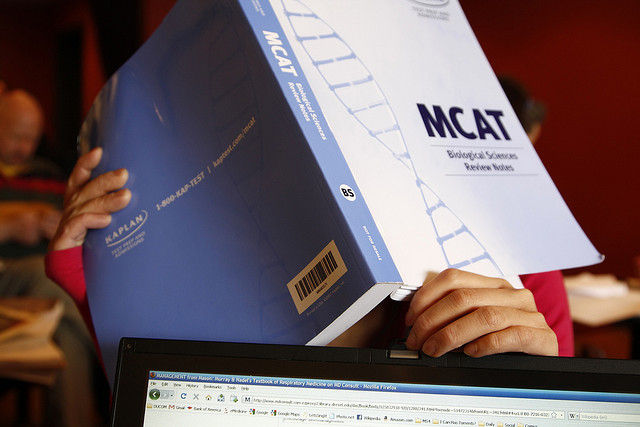
MCAT
The Medical College Admission Test, or MCAT, will undergo in April its biggest changes in the past 20 years.
The test, required for medical school applications, will be nearly twice as long and test students in three new content areas: biochemistry, psychology and sociology. This means students will need to prepare for three additional semesters of coursework on top of the eight semesters already needed for the current exam, said Eric Chiu, executive director of pre-med programs at Kaplan Test Prep.
“If students are in a position where they can take the current exam by January, before the test changes, we are strongly encouraging students to do so,” he said.
The last date to take the current exam is Jan. 23, 2015, and Chiu said spots for the remaining exams are filling up quickly.
But Wendy Loughlin, health professions advising director at this university, disagreed that students should rush to take the current exam.
“We feel our students have been learning in this very interdisciplinary way for a long time; we feel like they are going to be prepared for this test,” she said. “If they are not ready … it [would be] very foolish to rush to take this test because that MCAT score will become part of their permanent history.”
The new MCAT is designed to prepare future doctors for the rapid and drastic changes in the field of medicine and health care system, according to the Association of American Medical Colleges.
The AAMC creates and administers the MCAT and it collaborated with medical schools to create a test that assesses if students are able to apply what they know to problems that call for scientific inquiry and reasoning, Chiu said.
The addition to biochemistry attests to these changes, and coursework in biochemistry for pre-med students will be mandatory, as opposed to before, when it was highly recommended, Loughlin said.
“In medical school, you need to understand not only the biological processes of the body [but also] the chemical processes,” said Mylinh Vu, a senior biochemistry major. “Biochemistry is a good bridge of that.”
Chiu said the AAMC surveyed medical school admission officers, faculty and deans and found that biochemistry was a content area predictive of success in the medical field.
When Vu took the MCAT this month, she was given a trial section that contained questions in psychology and sociology. This section did not count toward her score but caught her off guard.
“I don’t feel adding psychology and sociology is really necessary,” she said. “These are a lot of the things you would learn in medical school.”
A Kaplan survey of medical school admission officers found that 44 percent of schools are indifferent as to which test version students submit when applying to medical school. Twenty percent recommended pre-med students take the current test, and 27 percent recommended they take the new test.
Most schools will be accepting scores from the current MCAT through 2017, with a few expressing preference depending on the application cycle, according to the AAMC.
“We’ve made changes in our curriculum with a much more integrative approach in mind,” Loughlin said. “My advice would be to trust the system and recognize everyone is going to be judged the same way. Doing poorly on the old MCAT is going to be much worse than doing average on the new MCAT.”



